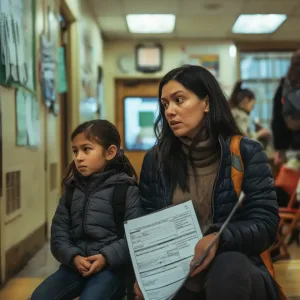An IEP implementation failure in NYC occurs when the Department of Education does not deliver the services, accommodations, or placement promised in your child’s Individualized Education Program (IEP). Parents have legal rights to enforce compliance under IDEA.
This blog will walk you through what constitutes an IEP failure, why it matters, the steps parents should take, and how an experienced attorney can protect your child’s right to a Free Appropriate Public Education (FAPE).
Overview of IEPs and Why Implementation Matters

An Individualized Education Program (IEP) is a legally binding document between a public school district and a family. It sets out:
- The child’s academic and functional goals
- Accommodations and modifications (e.g., preferential seating, assistive technology)
- Special education services (resource room, self-contained classes)
- Related services such as speech therapy, occupational therapy (OT), physical therapy (PT), or counseling
- Progress monitoring and reporting requirements
When implemented correctly, the IEP ensures that children with disabilities receive the services necessary to access learning. For the district, compliance also protects against legal liability under the Individuals with Disabilities Education Act (IDEA).
But when schools fail to implement an IEP as written, they risk denying FAPE, which can trigger disputes, complaints, and corrective legal action.
What Constitutes IEP Implementation Failure?

Implementation failures are more than small mistakes. They’re systemic breakdowns that deny a child legally mandated services. Common examples include:
- Missed therapies or services (speech, OT, PT)
- Incomplete or shortened sessions compared to what’s listed in the IEP
- Failure to deliver accommodations (such as preferential seating, assistive technology, or extra testing time)
- Wrong placement (placing the student in a setting inconsistent with the IEP, violating the Least Restrictive Environment requirement)
- Staff shortages leading to unqualified or unavailable service providers
- Improper IEP team composition or excluding parents from participation
- Missed timelines for evaluations, reviews, or annual meetings
In NYC, with the size of the DOE, these failures often occur due to overextended staff or administrative delays. Still, parents are entitled to strict compliance.
Consequences of Implementation Failure
When an IEP is not followed, the consequences go far beyond a missed session:
- Loss of instructional time leads to academic regression
- Delayed progress in speech, motor, or social skills
- Emotional harm such as frustration, low self-esteem, or behavioral issues
- Teacher burnout and increased stress on school staff
- Legal and ethical liability for schools that repeatedly fail to comply
The usual legal remedy is compensatory education—extra services designed to make up for lost instruction. This may occur after school, during weekends, or via private providers paid for by the DOE.
Steps for Parents When the IEP Isn’t Being Followed
If you suspect an iep implementation failure nyc, here are steps to take:
1. Document & Communicate
- Keep a written log of missed services or accommodations.
- Save emails or notes from teachers and providers.
- Contact the service provider directly for clarification.
2. Escalate Within the School or District
- Speak with your child’s special education teacher or principal.
- Involve the district’s special education director if the issue persists.
3. Request Compensatory Services
Parents can request makeup sessions or compensatory education from the DOE. This requires showing how much service was missed and how it impacted progress.
4. Facilitated IEP Meetings & Mediation
New York provides facilitated IEP meetings and state-appointed mediators to help resolve disputes without litigation. Mediation is voluntary but often successful.
5. File Formal Complaints
If informal steps fail:
- State complaint: Filed with the New York State Education Department when the DOE violates IDEA or ignores a hearing officer’s decision.
- Due process complaint: Initiates a legal proceeding before an Impartial Hearing Officer (IHO), who can order remedies such as compensatory education or tuition reimbursement.
How a Special Education Attorney Helps
An experienced iep meeting lawyer nyc plays a critical role:
- Case review: Analyze whether the school is complying with state and federal laws.
- Identify violations: Distinguish between procedural vs. substantive failures.
- Advocacy at meetings: Attend CSE meetings to ensure parents’ voices are heard.
- Negotiation: Work toward informal agreements, like revising the IEP or adding services.
- Representation: Handle mediation, impartial hearings, OCR complaints, or litigation if necessary.
Attorneys also fight for compensatory education and can secure tuition reimbursement if private placement is appropriate.
NYC-Specific Procedures and Resources
Parents in New York City should know about local procedures:
- Impartial hearing process: Independent hearing officers review disputes.
- Enforcement: If the DOE fails to follow an IHO order, parents can file a state complaint.
- Local resources:
- New York State Education Department complaint procedures
- Advocacy organizations like AFC (Advocates for Children of New York)
- Specialized firms such as Susan Luger Associates or Gerschel Law
Preventing IEP Implementation Failures
While some failures are unavoidable, schools and parents can minimize risks:
- Set measurable goals and baseline data in the IEP
- Regular progress monitoring and reporting to parents
- Staff training to ensure team members know legal obligations
- Proper IEP team composition including required specialists and parent involvement
- Parental engagement—parents should actively review logs, progress notes, and push for accountability
Conclusion and Resources
IEP implementation failures in NYC deny students their right to a meaningful education under IDEA. Parents should document issues, escalate concerns, and—when necessary—use legal remedies to secure services.
With the support of CSE meeting attorney nyc or a compensatory education lawyer nyc, families can hold the DOE accountable and ensure their children get the education they deserve.
FAQs About Iep Implementation Failure Nyc
Q1: What qualifies as an IEP implementation failure in NYC?
A: It includes missed or shortened services, failure to provide accommodations, improper placement, or delays in starting mandated supports.
Q2: How do I document missed services or accommodations?
A: Keep a written log, collect progress reports, and save emails from teachers or providers confirming service gaps.
Q3: What is compensatory education and how is it calculated?
A: Compensatory education makes up for missed services, usually by adding hours outside regular school time. It’s based on the amount of service lost.
Q4: What are the timelines for filing a state or due process complaint in NY?
A: Generally, complaints must be filed within two years of the violation, though certain exceptions apply.
Q5: What can a special education lawyer do that parents can’t?
A: Lawyers ensure compliance with IDEA, identify violations, represent families in hearings, and negotiate for stronger remedies like tuition reimbursement.

